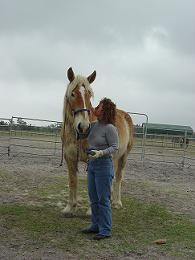Lessons from Natural Horsemanship
It's not an obvious metaphor, but natural horsemanship carries some powerful themes of self-leadership. I just returned from a 2 week course called "Liberty and Horse Behavior" at the Parelli Center in Florida, and while the name of the course doesn't sound like it has much to glean in the area of unleashing one's potential, the thrust of the 2 weeks was about how to be a better leader of yourself. Here are some of the major focal points:
* Observation - if we just have a result in mind and we don't
regard the always-present and ongoing feedback, including the
small details, we end up in disharmony, conflict, struggle, and
lost opportunity. Potential-revealing angle: Closely observe your
own mental and action patterns, and the choices you make based
on those patterns.
* Positive Interpretation - it's useless to observe if you don't
have a way to understand and interpret what you're seeing.
Your horse is never wrong, it's just doing what it understands or
feels safe enough to do (just like you!). Potential-revealing
angle: stop making yourself wrong for your choices. You made
them based on your best knowledge, experience, and energy.
Bashing yourself doesn't put you in an inspirational mindset
(just the opposite!) - which leads us to...
* Experimentation - "You have a 50/50 chance" of accurately
interpreting, and then making a plan based on that interpretation
that will work just as you'd like it to. Participants in the
course must have heard this maxim 10 times each day. Every
moment provides a new opportunity to try again, and if the
previous choice didn't work very well, just try a new one this
time. Potential-revealing angle: this sustainable, forgiving
strategy keeps you moving forward over the long-term.
* Another Parelli maxim is "Take the time it takes, so it takes
less time." I found I really had to slow down to not only
observe, but also allow my horse to take in the communication.
While I went twice as slow in the actions, it led to understanding
and results that were more than twice as fast as I would have
gotten had I not taken the time. What I was doing in that time
was building my own and my horse's confidence.
Potential-revealing angle: Confidence is rocket fuel for
effectiveness.
* An effective Phase 4 - Phases refer to pressure. Phase 1 is
soft and subtle, the equivalent of a few ounces, Phase 2 is no
more than 8 ounces, Phase 3 is a couple of pounds, and
Phase 4 is as much pressure as it takes to make the horse move.
I learned not to nag in Phase 2 and 3, but to hold a long Phase
1, then quickly proceed to an effective Phase 4 if I didn't get
results. It's similar to my "Hire a Hit Man" strategy - you're
making it uncomfortable for the horse to do something other
than what you'd like her to. Potential-revealing angle:
assign only potent consequences - and rewards - to help you
(or others) follow through.
I was told by more than one instructor that I was nagging my horse (ouch!) when asking her to back up or go sideways because I wasn't using phases as effectively as I could. I was doing a disservice to both of us by not going to an effective Phase 4. Once
Venus understood that I was willing to use Phase 4, she soon decided to cooperate at Phase 1.
This week, when you find yourself rushing, pause to observe your patterns and then interpret them without judgment. Experiment with new choices and actions, just for the sake of it. What would be an effective Phase 4 for you to take sustainable action on your most closely held objectives?
Kerul Kassel is the award-winning author of "Stop Procrastinating Now" and the newly released," Productive Procrastination." Her experience includes investment and real estate management as well as 20 years of leadership in for-profit and non-profit organizations. As the founder of New Leaf Systems - a consulting firm dedicated to creating higher performance outcomes and business profitability - her clients have included corporate organizations such as NASA, Sony Hilton, and Volvo. For more information or a free procrastivity report, visit www.newleafsystems.com.


Post new comment
Please Register or Login to post new comment.